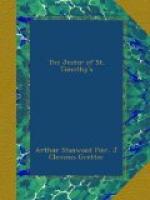“Mr. Upton,” said Westby deferentially, “how would you explain this? There’s a dog, and he must be doing one of two things; either he’s running or he’s not running. If he’s not doing the one, he is doing the other, isn’t he?”
“I suppose so,” said Irving.
“Well, he’s not running. Therefore—he is running. How do you explain that, Mr. Upton?”
Irving smiled feebly; the other boys were thinking it over with puzzled faces.
“That’s an old quibble,” said Irving. “The alternative for running is not running. Therefore when he’s not running—he’s not running.”
“I don’t see that that explains it,” answered Westby. “That’s just making a statement—but it isn’t logic.”
“He’s not running is the negative of he’s running; he’s not not-running is the negative of he’s not running—”
“Then,” said Westby, “how fast must a dog travel that is not not-running to catch a dog that is not exactly running but only perhaps?”
The boys laughed; Irving retorted, “That’s a problem that you might work out on the blackboard sometime.”
Thereupon Westby became silent, and Irving more than half repented of his speech; he knew that in its reference it had been ill-natured.
He noticed later in the day when he went up to the dormitory that the boys tiptoed about the corridors and conversed in whispers; there was an extravagant air of quiet. When they went down to supper, they tiptoed past Irving’s room in single file, saying in unison, “Sh! Sh! Sh!” They all joined in this procession—from Collingwood to Allison. Irving felt that he had taken Allison’s place as the laughing-stock, the butt of the dormitory.
In the evening they came to bid him good-night—not straggling up as they usually did, but in a delegation, expectant and amused. Westby and Collingwood were in the van when Irving opened his door in response to the knock.
“We didn’t know whether you’d shake hands with two such reprobates or not,” said Westby. “We thought it wasn’t quite safe to come up alone—so we’ve brought a bodyguard.”
Irving did not smile, though, all the boys were grinning. He shook hands formally with Collingwood, then with Westby, then with the others, saying good-night to each; as they left him, they tiptoed to their rooms. He thought grimly that, whatever might be the sentiments entertained towards him, he would not long be living in an atmosphere of ridicule.
Irving had charge of the “big study,” as it was called, during the hour immediately after morning chapel. The boys filed in from chapel and seated themselves at their desks; the members of the Sixth Form, who were privileged to study in their rooms and therefore had no desks in the schoolroom, occupied the stalls along the wall under the big clock. Last of all the rector entered and, mounting the platform, read the “reports” for the day—that is, the names of those who had transgressed and the penalties imposed. After the reading, the Sixth Form went upstairs to their Latin class with Mr. Barclay, and the day’s work began.




